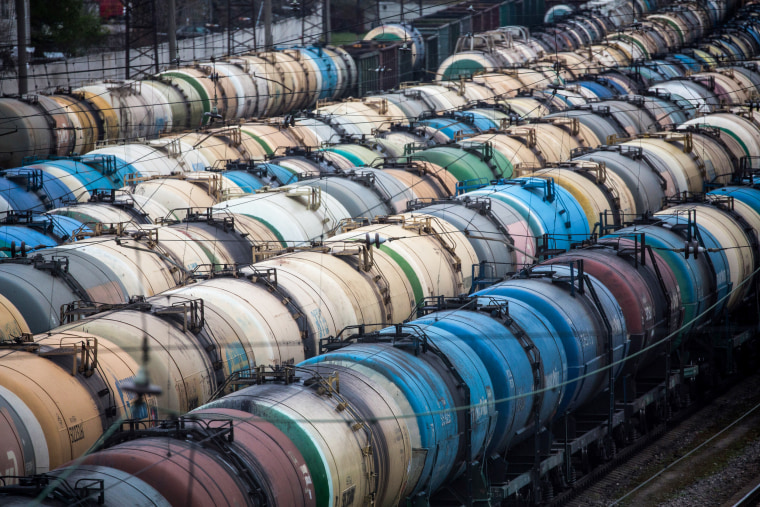WASHINGTON — The U.S. is in talks with European allies about banning imports of Russian oil, Secretary of State Antony Blinken said Sunday.
"I spoke to the president and the leading members of the Cabinet about this just yesterday from Europe, and we are now in very active discussions with our European partners about banning the import of Russian oil to our countries, while of course at the same time maintaining a steady global supply of oil," Blinken said on NBC's "Meet the Press."
Asked whether the U.S. would ban Russian oil "unilaterally," Blinken told host Chuck Todd: "A hallmark of everything we've done to date has been this coordination with allies and partners. We are much more effective across the board."
President Joe Biden faces growing calls from Democrats to ban imports of Russian oil as lawmakers try to find a way to stop President Vladimir Putin’s bloody war in Ukraine. House Speaker Nancy Pelosi, D-Calif., supported the move last week, saying "I'm all for" a ban on oil coming from Russia.
In his State of the Union address last week, Biden said the U.S. was working with 30 other countries to release 60 million barrels of oil in global reserves, half of which would come from the U.S. Strategic Petroleum Reserve.
Rising inflation and high gas prices have been key concerns for Biden and the Democrats as they try to defend their fragile majorities in the House and the Senate in the November midterm elections. U.S. gas prices are nearing all-time highs, hovering just below $4 a gallon, with the cost of gas having increased every day since the Russian invasion.
Sen. Joe Manchin, D-W.Va., said he supports banning Russian oil imports on “Meet the Press.” “I’m willing to at least do something and say 'whatever it takes.' We’re going to ramp up our energy. We’re going to basically produce the oil, the natural gas, build the pipelines."
Blinken also signaled that establishing a no-fly zone is off the table.
Biden has been “very clear about one thing all along, as well, which is we’re not going to put the United States in direct conflict with Russia," he said, saying that "if you declare a space 'no fly' and a Russian plane flies through it, it means we have to shoot it down."
"For everything we’re doing for Ukraine, the president also has a responsibility to not get us into a direct conflict, a direct war, with Russia, a nuclear power, and risk a war that expands even beyond Ukraine to Europe,” he added. “That’s clearly not our interest. What we’re trying to do is end this war in Ukraine, not start a larger one.”

Manchin said that he would not take a no-fly zone off the table yet but that "I would be very clear that we're going to support the Ukrainian people, the Ukrainian president and this government every way humanly possible."
Blinken said, meanwhile, that the U.S. actions have already had a “devastating impact on the Russian economy.”
“We see the approval in free-fall. We see the economy heading into a deep recession," he sad. "We’ve already had a major impact, but we are looking again as we speak in coordination with allies and partners at this process of banning oil imports."
